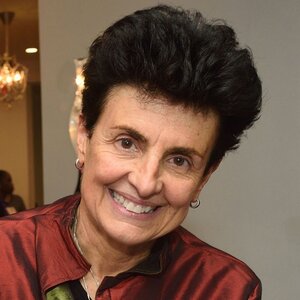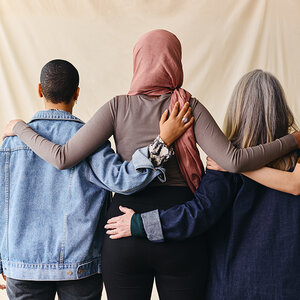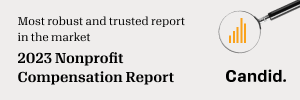Ana L. Oliveira, President and CEO, The New York Women’s Foundation: Investing in women and gender-expansive leaders
March 22, 2022
Ana L. Oliveira has served as president and CEO of The New York Women’s Foundation (The Foundation) since 2006, after leading Gay Men’s Health Crisis for seven years as its first woman and Latina executive director. Oliveira grew up in São Paulo, Brazil, earned an MA in medical anthropology from the New School for Social Research, and directed community-based programs at Samaritan Village, the Osborne Association, and Kings County and Lincoln hospitals.
Under Oliveira’s leadership, The Foundation has expanded its grantmaking—starting with a 20 percent increase in 2009, to $3.3 million—and awarded $9 million in 2021, bringing total grant dollars awarded to date to more than $100 million.
PND asked Oliveira about her priorities for 2022, the importance of investing in grassroots organizations, the fight for reproductive rights and criminal justice reform, and women’s and LGBTQ individuals’ advancement in the sector.
Philanthropy News Digest: In announcing that your foundation had reached $100 million in cumulative grantmaking over 35 years in support of community-based solutions to create a more equitable and just future for women, girls, and gender-expansive people, you noted that “we are also aware of the work left to do.” What are your top priorities for 2022? And for the next $100 million?
Ana L. Oliveira: The Foundation’s focus has been and will remain on investing in women and gender-expansive leaders to advance justice in their communities. This marks a pivotal year for The Foundation, as we celebrate our anniversary and will host the 35th annual Celebrating Women® Breakfast on May 11. Our top priorities in 2022 include deepening our practice of participatory and inclusive philanthropy, altering the traditional power structure of more traditional philanthropic approaches. We will deepen our proximity to community, increasing the presence of those with lived experience at all tables at The Foundation. We will continue to focus on funding those creating and organizing a city and a country that works for all through their gender, racial, and economic equity movements. We believe in a vibrant and participatory civil society, so we will also increase our support to those protecting and expanding democratic practices in the U.S.
We will also start our work to distribute our next $100 million in grants in the next 10 years! It will reflect our commitment to continued bold and intersectional funding that honors the leadership and vision of women and gender-expansive people.
PND: The latest round of grants saw more than $2 million awarded to 45 organizations, with an emphasis on emerging grassroots organizations led by women and gender-expansive people of color—half of them with annual budgets of $1 million or less. Why is it important to focus on emerging grassroots organizations at this time?
ALO: At The Foundation, we see the totality of each community. Problems and solutions exist in the same space. This means that the communities that experience the problems firsthand are also those that hold the solutions. By investing in community-based, grassroots organizations, we ensure that the agency-of-change is diverted back into the communities it was so wrongly taken from. This is where lasting and systemic change can occur.
By investing in community-based, grassroots organizations, we ensure that the agency-of-change is diverted back into the communities it was so wrongly taken from.
PND: In 2017, in the face of the Trump administration’s policies, your foundation increased its investments “by an additional $1 million toward programs working to protect immigrant rights, combat racism and discrimination, promote anti-violence and safety, protect women’s health and reproductive justice, and building women’s economic security.” What was the greatest challenge The Foundation faced during those four years, and what was its greatest accomplishment?
ALO: The impacts of the Trump administration will be felt by communities of women, LGBTQ+ and gender-expansive people, immigrants, and people with disabilities—and in particular those of color—for years to come. Our greatest challenge during that time was meeting the increasing needs of our grantee partners, who were directly discriminated against, disenfranchised, or harmed by federal policy changes. We mobilized quickly to develop the Resilience NYC initiative and later the Resilience-NYC: COVID-19 Response and Recovery Fund to support organizations solving critical issues. It paved the way for our greatest accomplishment, which is an increased focus on strategies that support immigrant rights, political empowerment, and women’s civic engagement and leadership. Our approach as funders is never to wait until crisis strikes to invest in women—we do that day in, and day out.
PND: Women’s health and reproductive justice is perhaps under greater threat today than ever before in the nearly 50 years since Roe v. Wade, with legislation in Texas and Mississippi essentially eliminating access to abortion services. How optimistic or pessimistic are you about the trajectory of reproductive rights in the United States?
ALO: With the recent news coming out of the Florida legislature, we are on a dangerous path for reproductive rights in this country. And for poor and working-class women and gender-expansive people, a disproportionate number of whom are Black and brown, overturning Roe v. Wade won’t mean that abortions will end. It will mean that safe abortions in healthcare facilities will move further out of reach. So, as an organization that promotes and advocates for women and gender-expansive people, it is our duty to keep fighting against this assault on our bodies that is [disguised] as policy.
PND: The 2019-21 strategic plan included “strengthening [its] workplace as a model of equity and excellence,” whereas many foundations and nonprofits have only begun to apply an equity lens to their own operations in the last couple of years. Can you share a little about how you've implemented that strategy?
ALO: The Foundation is an organization by and for women, so it’s important that our operations reflect our vision of creating and equitable and just future for all. Since the creation of our strategic plan, I’m proud to say we’ve taken steps to create a space that supports women’s leadership at all levels. Our board consists of a majority women of color, and women from different backgrounds and identities who hold The Foundation’s values of equity and excellence. And as we saw the stressors women face increase with the COVID-19 pandemic, we took steps to implement healing justice and wellness practices for our dynamic staff, including our first restorative break—a two-week period where all Foundation-related business is on pause, allowing their rejuvenation.
PND: You’ve said that “[m]obilizing for criminal justice reform can’t be done without creating a paradigm shift that centers the experiences of women and families,” and the Justice Fund was launched in 2018 to support efforts to close Rikers Island and advance improvements within the local jail system. What progress have you seen in improving jail conditions so far?
ALO: We created The Justice Fund over four years ago because we understood two key things. First, this is a problem that requires long-term investment, and second, our role is to invest in those who have been impacted by incarceration because they hold the answer to creating the greatest impact.
The work that must be done to dismantle an oppressive structure such as the prison system takes time and energy from countless individuals. We have seen steps taken by grantee partners such as A Little Piece of Light, Alliance of Families for Justice, and the Women’s Community Justice Association that advocate for system-impacted women and families. In addition, many of our grantee partners shed light on the far-reaching failures of the entire system, from the family court system to supporting system-impacted women as they reenter society. The role of philanthropy in this movement is one that can’t be underscored [enough]. With ongoing human rights violations at Rikers Island and the disenfranchisement of system-impacted women, it’s urgent that funders come together to promote decarceration efforts, invest in healing services, working with women and gender-expansive people at every step of the process.
With ongoing human rights violations at Rikers Island and the disenfranchisement of system-impacted women, it’s urgent that funders come together to promote decarceration efforts, invest in healing services, working with women and gender-expansive people at every step of the process.
PND: As someone who previously led GMHC and served on the New York City HIV Planning Council and the New York City Commission on AIDS, how do you assess the public health response to the COVID-19 pandemic over the last two years? Should or could nonprofits and grantmakers have played a greater or different role?
ALO: The COVID-19 pandemic laid bare the fact that public health is a matter and a reflection of the state of justice and equity. Without a framework that centers those closest to the harms created by the pandemic, we risk excluding communities of immigrants, caregivers, elders, and more from vital protections and from lasting solutions. For many nonprofit organizations, the pandemic has been and continues to be a time of incredible challenges. Our grantee partners are frontline workers in their communities, and we gladly accepted the responsibility as funders to increase our investments in their work when it was most needed.
PND: As the leader of a women’s foundation, how do you see the state of women’s and LGBTQ individuals’ advancement in the nonprofit and philanthropic sectors?
ALO: The leadership of women and gender-expansive people in the nonprofit and philanthropic sectors is vital to advancing long-term solutions for change. It’s critical that organizations continue to invest in their leadership. Doing this allows women and gender-expansive people, and especially those of color, to have the agency and voice needed to ignite change, in their own communities and beyond.
—Kyoko Uchida







